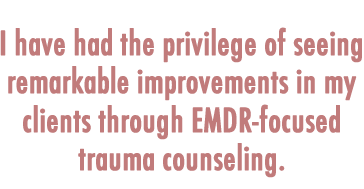“How would your life be different if…You didn’t allow yourself to be defined by your past? Let today be the day…You stop letting your history interfere with your destiny and awaken to the opportunity to release your greatest self.”
-Steve Maraboli
Has a Disturbing or Distressing Event Affected Your Ability to Feel and Function Well?
Do you feel anxious, stressed and easily triggered about something that happened recently or long ago? Are you struggling with looping thoughts, uncomfortable memories, intrusive flashbacks or nightmares? Do you feel ashamed about what happened to you or someone you love and wonder if it was your fault? Perhaps you experienced a sudden, life-threatening event, such as an assault, an accident, an illness or surgery. Or, maybe you – either as an adult or as a child – suffered long-term abuse, neglect or chronic pain and illness. You may remember being bullied or humiliated early in your life, but question how childhood experiences could still be impacting you today. You may be overwhelmed with feelings of sadness and low self-confidence and struggling to perform well at work or in your personal life. Maybe you feel you should be “over it” and fear there is something wrong with you because you are unable to move on. Do you feel trapped in negative, ongoing thoughts about yourself, others, or the world? More than anything, do you wish you could feel safe and at peace in your mind and body, trust your own instincts and move forward as your authentic self?
If you are living with the symptoms of trauma, you likely feel isolated, overwhelmed and unable to trust anyone, even yourself. You might feel unable to be vulnerable with those around you and find it difficult – or even impossible – to form healthy, lasting relationships, especially if part of you believes that you don’t deserve happiness. Maybe you isolate in an attempt to avoid people, situations or sensations that could bring you back to the traumatic memory. You might be trying to bury the pain of the past by using alcohol, drugs, food or other unhealthy distractions to numb out or seek temporary relief. It may seem that you’re consumed by distressing, disturbing thoughts and memories, which make you feel on-edge and unable to fully engage in the present moment. Perhaps you are struggling more and more to get through each day, connect with others and feel happy and safe.
Understanding Trauma
Trauma is defined as a deeply disturbing or distressing experience in which someone feels powerless or out of control. Trauma can range from small, single incidents to long-term, repetitive and complex experiences. The majority of adults have survived something upsetting enough to have impacted the way they navigate and understand the world. According to the Center for Disease Control, 70 percent of American adults will experience some form of trauma over the course of their lives, and almost half of the nation’s children will experience at least one or more types of serious childhood trauma. Whether you experienced or witnessed a single-incident trauma, such as an accident or assault, or an ongoing, complex trauma, such as abuse or neglect, you are not alone.
It is important that you know that if you are struggling with life-disrupting memories, flashbacks, nightmares or fears, you are not damaged or weak. Traumatic experiences interrupt the way the brain adaptively processes and stores information, making it difficult to put the trauma into its proper context. This means that the memory, along with the images, emotions, thoughts and physical sensations associated with it, do not feel as though they are truly in the past. Instead, the experience – or fragments of it – can pop up at any time. It can be triggered by a touch, smell, sound or other sensory reminder of what happened.
Sometimes distressing feelings arise without the conscious memory attached, which can make it difficult to understand why you are suddenly feeling nervous or unsafe. You may be subconsciously repeating self-sabotaging or life-limiting patterns in an attempt to seek out the familiar or keep yourself safe, such as staying in toxic relationships because it is what you know and what you believe you deserve. Thankfully, through trauma counseling, you can process traumatic memories and find greater relief, ease and confidence than you ever thought possible.
Trauma Therapy Can Help Release the Pain of the Past
It is possible for you to live with a sense of comfort, security and self-assurance. In my trauma practice, I use several empirically based and effective treatments including Cognitive Behavioral Therapy (CBT), Mindfulness Therapy and Eye Movement Desensitization and Reprocessing (EMDR) therapy to help my clients process and heal from past trauma. EMDR, particularly, has been widely researched and proven to be the most effective form of treatment for trauma. Both the American Psychiatric Association and the Department of Veterans’ Affairs recommend EMDR therapy for the treatment of both complex and single-incident trauma, regardless of the nature of the trauma.
EMDR is not just talk therapy. Unlike talk therapy, the insights you gain in EMDR result from your own accelerated intellectual and emotional processes, not from your therapist’s interpretation. Our brains and bodies are hard-wired for healing. Using EMDR, you can heal a psychological trauma in the same way your body heals a wound. Imagine you cut your hand. Immediately, your body’s automatic healing mechanism will begin to seal and repair the cut. But, if a foreign object, such as a splinter, finds its way into the cut, the body’s natural healing mechanism will be blocked, leading to infection and prolonged pain until the object is removed. The brain works in a similar way. Your mind has its own natural healing mechanism, which automatically works to process and store information in order to help you regain stability and wellbeing. However, a traumatic experience can block or unbalance that mechanism, and your emotional wounds can fester, producing intense, ongoing suffering. Through EMDR, you can activate the natural healing process in your brain, releasing the block and restoring the balance needed for lasting relief and peace. You can bring the trauma to resolution, replacing your anxiety, fears and negative thoughts with new insights and positive beliefs. Thus, you will be better able to move through the world with greater ease and an enhanced sense of calm.
During EMDR-focused trauma therapy, we will work together using a three-pronged approach to address past memories, examine the current places you are feeling stuck and identify actions you can take to move forward in your life. With EMDR, you can process past events and eliminate the power of current triggers. At the same time, EMDR will open up the possibility for positive future experiences since you are no longer being held back by your past. It will not force you to be re-traumatized, and as a compassionate, non-judgmental and understanding therapist, I will not push you to try something that you’re not willing to undertake. Instead, we will gently explore your challenges in a safe, confidential space where you can feel comfortable expressing anything and everything. When we begin EMDR, it will be a mutual decision based on your history, needs and goals.
In sessions, we will work collaboratively to draw connections between what you are struggling with today and the distressing experiences of your past. I will provide you with a variety of tools to help you heal before, during and after EMDR, including mindfulness, grounding, stabilization and cognitive techniques. By using these tools, you will be able to alleviate discomfort in tense situations as well as learn how to more effectively manage and navigate your life. Trauma therapy can give you an increased sense of control over your life, help you feel more empowered and better able to engage with others and enable you to more effectively reach your goals. As you cultivate an increased awareness of your core authentic self, you can also nurture healthier, more intimate relationships with those around you. With a new sense of self-confidence, empowerment and balance, you will find yourself better able to be open and vulnerable with yourself and others.
As a certified EMDR therapist, I have received extensive training in this therapeutic modality and have had the privilege of seeing remarkable improvements in my clients through EMDR-focused trauma counseling. EMDR therapy has enabled my clients to internalize more positive beliefs about themselves and adopt healthier and more realistic perspectives. Worldwide, EMDR has helped millions of people find long-term relief. No matter what you’ve experienced, you, too, can discover your authentic self and see the world through a new, brighter lens.
You may believe that therapy can help you find healing, but still have questions or concerns…
I think talking about the memories will be too much for me to handle...
I know that the idea of working through traumatic memories can seem daunting. But, if you find yourself stuck in harmful patterns and toxic relationships, you are likely already struggling with a great deal of pain. As you talk about what happened with a trained trauma therapist, such as myself, you will discover that the memory begins to lose its power. During trauma counseling, we will work together, at a pace you are comfortable with, so that you can identify the root causes of your current challenges. Honoring your experiences and perspective is essential in healing emotional wounds and living with greater confidence and peace. Becoming more in tune with your thoughts, feelings and physical sensations, as well as the triggers that bring your trauma flooding back, is key to establishing the foundation you need to move forward in your life. In addition, the goal of counseling is never to re-traumatize you. EMDR is highly effective without forcing you to re-experience the same intense fear and pain.
I’m too messed up, This won’t work...
You are not broken, and it is never too late to heal. The pain, shame and hurt you are feeling may have left you questioning who you really are and what you are worth. Internalizing self-inflicted negativity can be a hard pattern to break, which is why trauma treatment can be so valuable. EMDR is proven to work, and after engaging in the therapy process, my clients often say they have found relief from not only their negative memories, but also negative self-talk and low self-worth. Additionally, they report that they feel less anxious and emotionally reactive, more confident and better able to trust and be authentic with themselves and others. No matter what you experienced or where you are now, healing is possible.
I’ve tried trauma therapy before, and it didn’t help...
Trauma is held in the body. That means that talk therapy alone is rarely an effective form of trauma treatment. EMDR therapy addresses both the mind and body, restoring connection and overall balance. And, unlike talk therapy, EMDR allows healing to come from your own body, not the therapist’s interpretation of your experience and emotions. After EMDR, 84 to 90 percent of single-incident trauma survivors report that they no longer suffer from symptoms of trauma. The majority of complex trauma survivors also report relief. If you are ready to engage in the therapy process, you can restore your body’s natural healing mechanism and discover your most authentic, empowered self.
You Can Reclaim Your Life
I believe that a trusting, safe and comfortable therapeutic relationship is essential to healing, especially if you have experienced trauma. I understand that the decision to seek professional help can feel intimidating, which is why I offer a free 15-30 minute phone consultation to explore how I can help you specifically and to see if we are a good fit. I invite you to call me at 480-427-3553 or contact me here. We can discuss your particular needs, and I can answer questions you may have about trauma treatment and EMDR.








